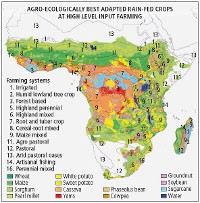22 July 2013
Data portal unlocks potential to increase food production
One way to increase food production is to make farming more efficient. In regions such as Eastern Europe, Central Asia, or sub-Saharan Africa, much of the land already used for agriculture could be farmed more efficiently, producing more food from current resources.
But how do policymakers identify these locations? How do they know what changes to implement to increase crop production? And how can they be sure that their new policies will not sacrifice sustainability or the environment? The Global Agro-ecological Zones (GAEZ) portal just may provide the crucial information.
The GAEZ data portal, launched in May 2012 by the Food and Agriculture Organization of the United Nations (FAO) and IIASA, holds thousands of geographic datasets including the location and magnitude of yield gaps—the difference between the current crop production and what could potentially be produced. The portal contains extensive data on land, water, and other agricultural resources, as well as data on yield potential and actual yields for a number of crops and commodities. It also includes environmental data about current climate, soil, terrain conditions, and future climate conditions and their impact on future food production.
Over the last year, the portal has become a valuable tool for policymakers, NGOs, scientists, and students. Every month since the launch over 400 users have used the FAO and IIASA GAEZ Data Portals to download approximately 3GB of data. For example, a consortium led by the Australian International Food Security Centre in Canberra has used GAEZ data to update and characterize farming systems in sub-Saharan Africa, to define priorities for science and policy. Another recent assessment used GAEZ data to assess land use options and associated water use requirements on the island of Mauritius.
Subscribe to Options Magazine


